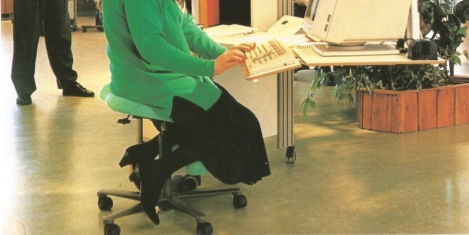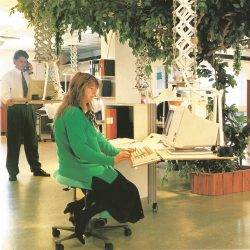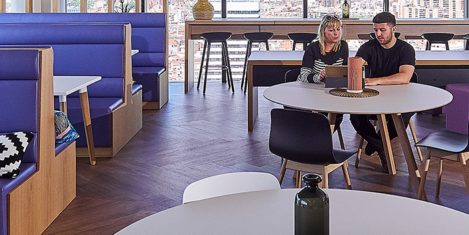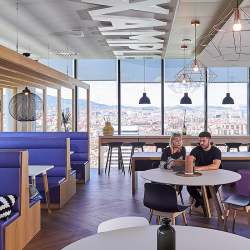To provide the best experiences, we use technologies like cookies to store and/or access device information. Consenting to these technologies will allow us to process data such as browsing behaviour or unique IDs on this site. Not consenting or withdrawing consent, may adversely affect certain features and functions.
The technical storage or access is strictly necessary for the legitimate purpose of enabling the use of a specific service explicitly requested by the subscriber or user, or for the sole purpose of carrying out the transmission of a communication over an electronic communications network.
The technical storage or access is necessary for the legitimate purpose of storing preferences that are not requested by the subscriber or user.
The technical storage or access that is used exclusively for statistical purposes.
The technical storage or access that is used exclusively for anonymous statistical purposes. Without a subpoena, voluntary compliance on the part of your Internet Service Provider, or additional records from a third party, information stored or retrieved for this purpose alone cannot usually be used to identify you.
The technical storage or access is required to create user profiles to send advertising, or to track the user on a website or across several websites for similar marketing purposes.
 Facilities managers are responding to a range of macro influences such as changing demographics, the uptake of flexible working, new technology and social change by adopting a new way of looking at the workplace, claims a new report from CBRE. The report claims to identify the major trends in facilities management, most important that people increasingly want to choose where and when they work and the effect this has on the physical workplace and its features, services and technology.
Facilities managers are responding to a range of macro influences such as changing demographics, the uptake of flexible working, new technology and social change by adopting a new way of looking at the workplace, claims a new report from CBRE. The report claims to identify the major trends in facilities management, most important that people increasingly want to choose where and when they work and the effect this has on the physical workplace and its features, services and technology.










 Traditional job roles are becoming more complex due to digital transformation initiatives a new poll claims, with UK businesses having to wait more than five months, on average, for new joiners to get up to speed in their jobs. In the research by Robert Half of almost 5,000 CFOs in 14 countries, CFOs in the UK report that the key skills for finance professionals are changing. With digital transformation a priority for many organisations, there is now more focus on skills such as data analysis (cited by 43 percent of CFOs), financial analysis (35 percent), and data forecasting (34 percent). Finding the right people with these abilities is made even more challenging by the fact that businesses around the world are struggling to find qualified professionals. Almost all (93 percent) UK businesses find it challenging to attract qualified accounting and finance professionals. Globally, the issue is equally pronounced, with 94 percent of businesses also reporting similar challenges.
Traditional job roles are becoming more complex due to digital transformation initiatives a new poll claims, with UK businesses having to wait more than five months, on average, for new joiners to get up to speed in their jobs. In the research by Robert Half of almost 5,000 CFOs in 14 countries, CFOs in the UK report that the key skills for finance professionals are changing. With digital transformation a priority for many organisations, there is now more focus on skills such as data analysis (cited by 43 percent of CFOs), financial analysis (35 percent), and data forecasting (34 percent). Finding the right people with these abilities is made even more challenging by the fact that businesses around the world are struggling to find qualified professionals. Almost all (93 percent) UK businesses find it challenging to attract qualified accounting and finance professionals. Globally, the issue is equally pronounced, with 94 percent of businesses also reporting similar challenges.
 Employers need to recognise the workplace as integral to delivering a business’ commercial strategy, and treat employees as ‘workplace consumers’ – creating ‘frictionless’ experiences and environments that help them perform to their best ability. This is according to a report: ‘Optimising performance: defining, designing, maintaining and evolving workplace experiences’ from Interserve, undertaken in partnership with Advanced Workplace Associates (AWA). The two-year study into the science behind effective working environments argues there is a need to radically re-envisage workplaces to optimise team productivity and maximise the value of physical working environments. It sets out a series of critical steps for knowledge-based businesses to revolutionise the workplace – and thereby aid employee performance. The report argues that traditional silos, from IT and HR to facilities, need to be broken down to integrate the management of the workplace as part of a ‘one-team’ approach; doing so will ensure companies can deliver a streamlined workplace experience which supports employee productivity.
Employers need to recognise the workplace as integral to delivering a business’ commercial strategy, and treat employees as ‘workplace consumers’ – creating ‘frictionless’ experiences and environments that help them perform to their best ability. This is according to a report: ‘Optimising performance: defining, designing, maintaining and evolving workplace experiences’ from Interserve, undertaken in partnership with Advanced Workplace Associates (AWA). The two-year study into the science behind effective working environments argues there is a need to radically re-envisage workplaces to optimise team productivity and maximise the value of physical working environments. It sets out a series of critical steps for knowledge-based businesses to revolutionise the workplace – and thereby aid employee performance. The report argues that traditional silos, from IT and HR to facilities, need to be broken down to integrate the management of the workplace as part of a ‘one-team’ approach; doing so will ensure companies can deliver a streamlined workplace experience which supports employee productivity.




 The way to measure an employer’s speed of innovation includes how they find talent, their appraisal process, how employees recommend the organisation they work for to others, and how much employees collaborate, claims a new European study by Cornerstone OnDemand and IDC. “Future Culture: Building a Culture of Innovation in the Age of Digital Transformation” explores the relationship between European organisations’ speed of innovation and talent management, with the research showing that firms with a steady stream of new products and services are more likely to have an ongoing feedback process with employees, rather than an annual performance review, while organisations with a slower rate of innovation often use coaching and mentoring to develop employees.
The way to measure an employer’s speed of innovation includes how they find talent, their appraisal process, how employees recommend the organisation they work for to others, and how much employees collaborate, claims a new European study by Cornerstone OnDemand and IDC. “Future Culture: Building a Culture of Innovation in the Age of Digital Transformation” explores the relationship between European organisations’ speed of innovation and talent management, with the research showing that firms with a steady stream of new products and services are more likely to have an ongoing feedback process with employees, rather than an annual performance review, while organisations with a slower rate of innovation often use coaching and mentoring to develop employees.












June 28, 2018
Ten demonstrable truths about the workplace you may not know
by Kerstin Sailer • Comment, Facilities management, Features, Workplace design
(more…)